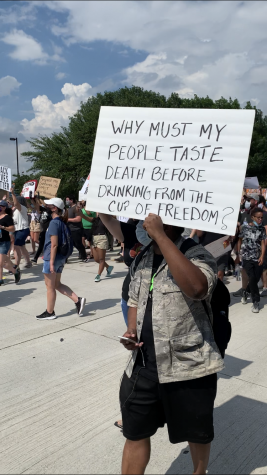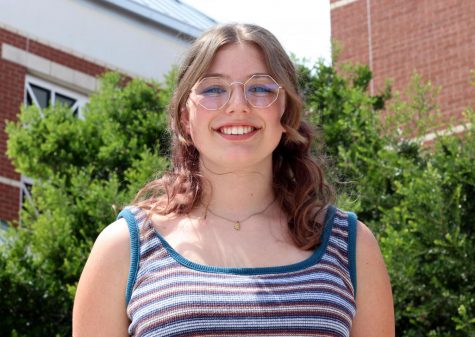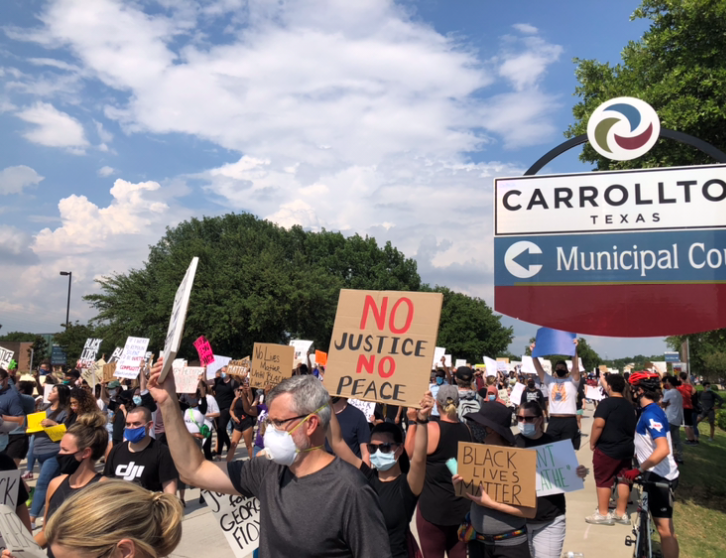Peaceful protest held in Carrollton
photo by Kate Knauff
Protesters march with signs in front of the Carrollton Municipal Court. The protest was in solidarity with other Black Lives Matter protests across the nation, but there are many other ways to support the BLM movement. “Try to research as much as you can,” senior Jacquelyn Burrer said. “Read as many things as you can to learn about the reforms that need to happen. Obviously, not everyone will want the same level of reform, but there is a common goal in the movement: that something needs to change. As long as people are getting involved and continue to speak out about what is important, we can prioritize changing the system.”
A sea of people and posters flooded the streets of Carrollton as the words “Justice for George Floyd” drifted through the air. People from a variety of racial backgrounds flowed together to speak up about police brutality and remember people who have been killed by those who are supposed to protect.
On May 25, George Floyd died after a police officer in Minneapolis, Minnesota knelt on Floyd’s neck for nearly nine minutes. Since then, protests have erupted across the nation. While many of the protests have stayed peaceful, the social media has been overwhelmed with pictures, videos and articles showcasing the ones that ended in riots, looting and tear gas. One of the many protests that stayed peaceful happened in Carrollton, organized by two Hebron students, senior Jaquelyn Burrer and alumnus Colin Welty.
“The entire protest was in solidarity with the other protests around the world,” Welty said. “It was against racial justice, for prison reform, criminal justice reform, the black community, the oppressed and the minorities.”
The protest happened on June 2 from 3 p.m. to 5 p.m. on E. Jackson Road near the Carrollton Police Department and the Carrollton Municipal Court. Welty and Burrer planned the protest in three days and spread the news through social media. They were originally only expecting 50-200 people, but more than 600 people showed up.
“It was originally intended to be for Hebron students that we knew who wanted to come out and support, but it spread like crazy and there were a lot more people there,” Burrer said. “We just wanted to offer a safer option for people who wanted to help.”
During the protest, Carrollton police blocked off traffic so protesters could march safely in the street. Chants such as “Say his name, George Floyd” and “No Justice, No Peace” were shouted as more than 600 protesters marched down the street carrying signs.
“I was feeling equal parts excited and scared [during the protest],” Welty said. “I was excited to be able to have this protest so we could advocate for criminal justice reforms, support protesters from around the world and see the community of Carrollton come together to fight for one cause. I was also scared because this is not something that I have ever done before. It was very scary to have the police on one side and the protesters on the other and to be in charge of all of that, and make sure me and Jacquelyn are keeping people safe.”
Toward the end of the protest, the protesters marched down E. Jackson road to the Carrollton Amphitheater where city employees such as Mayor Kevin Falconer and former LISD Trustee Kronda Thimesch spoke along with Welty, Burrer and Burrer’s friend Ruby Pullum.
Welty, Burrer, Pullum, Thimesch and others talked about the reforms they wanted to see and ways they will work towards those reforms while on stage in the amphitheater. At one point, Pullum shouted into the crowd “If you are not angry, get angry, and if you are angry, get angrier!”
“This is not my job, but I am glad to do it when it comes to me,” Pullum said. “I want to educate my white allies and my friends who want to help. It shouldn’t have to be my job, but I fully support those people trying to help. I have been trying to aid others and get myself on the front lines.”
While the original protest ended around 5 p.m., some protesters stayed after to continue to speak up about the Black Lives Matter Movement and talk about reforms they want to see. The remaining protesters shut down Josey and Jackson and some marched all the way to Trinity Mills.
“I was talking to this one girl [after the original protest] who was just bawling her eyes out because she was one of the two Indigenious people there and she was just so upset,” Burrer said. “It was heartbreaking. I was just trying to convince her that she would be OK. We were just standing in the middle of the intersection hugging and we had this insane moment.”
Burrer and Welty plan on meeting with Carrollton city council members and police in order to talk about reforms and other issues.
“One protest only gets the message out there, and what we need to be able to do is work toward reforming the political systems that allow racial injustice in our society,” Welty said. “We also need to work on criminal justice reform with the police and with prison systems within Carrollton. Hopefully, we can set a precedent for the rest of the United States so that we can move forward on reform in the country.”

Burrer and Welty said they have received praise for organizing the event, but believe the media attention takes away from the message of racial injustice and criminal justice reforms.
“What seems to be focused on afterwards is the fact that two white teenagers were able to put this together,” Welty said. “I think that in itself epitomizes white privilege. It is unfortunate to me that people want to focus on that, not the 700 people of color who came out and advocated for their rights. Not the fact that we are having real talk in the city about criminal justice reform, but that two white teenagers were able to put this together.”
More peaceful protests are being planned in cities close to Carrollton by members of the March For Our Lives Greater Dallas Chapter. Burrer said that while protests are a way to be heard, there are other ways to support the BLM movement. Anything from donating to signing petitions can help support the end of police brutality and the corrupt justice system. It is also important to research and vote in the upcoming elections.
“I think all of us have power and all of us can speak into this,” Thimesch said. “We need to reach out not only to our families, but also to our communities and have conversations with people that don’t always look like us. Ask them, what have you walked through, what are your experiences and how can I help you. Then together, ask yourselves how you can lock arms to help someone else who needs a hand.”

Senior Kate Knauff is the news section editor and this is her third year on staff. She enjoys drinking coffee, hanging out with her friends and watching...



